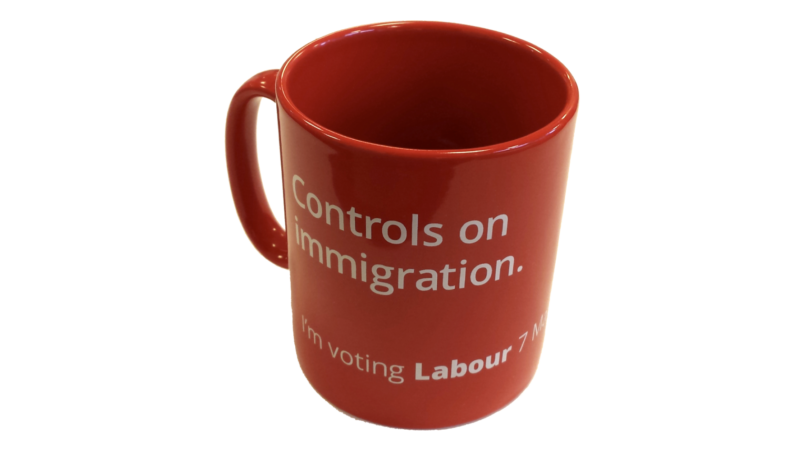
Labour unveiled a string of new policies this morning in the government’s immigration white paper, but the Prime Minister’s hardline rhetoric on the need to “take back control” is far from new.
Some phrases like “an island of strangers” are new ways to grab headlines, but the Prime Minister was able to point out in his setpiece speech today [transcript likely here soon] that three years ago he warned business leaders they were too dependent on immigration, and should train up more British workers.
He told the CBI conference in 2022 that “the days when low pay and cheap labour are part of the British way on growth must end”, and slammed “immigration dependency”.
So when he dismissed the idea today was some kind of total U-turn just based on fighting Reform after Labour’s local election drubbing – alluding to the “people who like politics [who] will try to make this all about…targeting these voters, responding to that party” – he had at least some grounds for it.
The white paper has also been long in the works, rather than cooked up in the last week – though it is hard not to see the timing as anything but political.
Subscribe here to our daily newsletter roundup of all things Labour – and follow us on Bluesky, WhatsApp, Threads, X or Facebook.
The trouble for Starmer is, a few years appears about as far back as he can go into his own archive – as he has come a very long way indeed from his stances of old.
It was all too easy for several Westminster journalists to grill him this morning in the post-speech Q&A on what they politely called his “journey” on migration. Expect Reform and the Tories to do more of it too in the coming years. And when he denies that, saying as he did today that there’s been a “core consistency” in his views, he is raising the stakes by making it not only an authenticity issue, but one of sincerity.
Tricky for Starmer to claim a ‘core consistency’ in his migration stance
"I believe we need to reduce immigration significantly"
PM Sir Keir Starmer is holding a news conference in Downing Street, setting out his plans to dramatically reduce net migration
Live updates ➡️ https://t.co/RF8qzL2sV3
📺 Sky 501, Virgin 602, Freeview 233 and YouTube pic.twitter.com/GqsH9wKiCI
— Sky News (@SkyNews) May 12, 2025
Starmer was far from a hardline critic of immigration as shadow Brexit secretary in the late 2010s, and is widely seen to have prioritised pushing for closer EU relations over ending free movement under Jeremy Corbyn’s leadership.
Crucially one of his 10 major Labour leadership campaign pledges in 2020 said little about control, and vowed to uphold EU-style free movement of EU nationals in and out of Britain.
Instead it simply read: “Full voting rights for EU nationals. Defend free movement as we leave the EU. An immigration sytem based on compassion and dignity. End indefinite detention and call for the closure of centres such as Yarl’s Wood.”
That was to a different audience, of course, but it doesn’t tally with the idea there’s a “core consistency” in Starmer’s stance.
Voters are acutely sceptical on migration
Hence Starmer faces questions today not only about Treasury-Home Office divides about immigration, whether today’s smattering of measures will be anywhere near enough to immigration numbers, and social care industry and Unison alarm over care worker visa tightening.
The PM also faces questions like whether he still believes migration boosts growth, and why he has called before for deportation flights to be halted.
For all he can point to past speeches as leader, talk up toughness as a “Labour argument” and be strikingly clear “growth didn’t shift” as migration soared under the Tories, he faces a major challenge convincing voters on an issue where many are particularly sceptical.
"Net migration quadrupled in four years. We've never seen that before"@SamCoatesSky asks Keir Starmer about his message to the treasury and if he is changing the cost-benefit analysis of growth in migration
Live updates ➡️ https://t.co/RF8qzL2sV3
📺 Sky 501 pic.twitter.com/zm6ikznA9X
— Sky News (@SkyNews) May 12, 2025
Given how far immigration rose under New Labour without voters being explicitly asked about it, and again under the Tories despite the Tories repeatedly claiming they’d bring it down, Labour faces a real challenge getting a hearing, whatever its message.
Boris Johnson and Donald Trump may have managed a rebrand from socially liberal-sounding city mayors to immigration hawks, but when Ed Miliband tried sounding hardline as Labour leader, few voters seemed to buy it. Remember the laughs and sneers that greeted Miliband-era Labour’s ‘controls on immigration” mugs?
Keir Starmer clearly sounded plausible enough to help neutralise the issue at a general election where voters wanted to evict or punish the Tories, but managing the same against Reform now feels no less tough a task – particularly when the more he tacks right, the greater the risk to the left.
- SHARE: If you have anything to share that we should be looking into or publishing about this story – or any other topic involving Labour– contact us (strictly anonymously if you wish) at [email protected].
- SUBSCRIBE: Sign up to LabourList’s morning email here for the best briefing on everything Labour, every weekday morning.
- DONATE: If you value our work, please chip in a few pounds a week and become one of our supporters, helping sustain and expand our coverage.
- PARTNER: If you or your organisation might be interested in partnering with us on sponsored events or projects, email [email protected].
- ADVERTISE: If your organisation would like to advertise or run sponsored pieces on LabourList‘s daily newsletter or website, contact our exclusive ad partners Total Politics at [email protected].




More from LabourList
‘The hope that kills you’: Reflections from the final day in Gorton and Denton
MPs, union leaders and organisations react to ‘bruising’ Gorton and Denton result
A gory night for Labour